商务英语
商务英语900句

1 I want a package deal including airfare and hotel.我需要一个成套服务,包括机票和住宿2 I'd like to change this ticket to the first class.我想把这张票换成头等车。
3 I'd like to reserve a sleeper to Chicago.我要预订去芝加哥的卧铺。
4 I won't check this baggage.这件行李我不托运。
5 I'd like to sit in the front of the plane.6 I missed my train.7 I haven't nothing to declare.我没申报的东西。
8 it's all personal effects.这些东西都是私人用品。
9 I'll pick up ticket at the airport counter.我会在机场柜台拿机票。
10 I'd like two seats on today's northwest flight 7 to Detroit, please. 我想订两张今天西北航空7班次到底特律的机票。
11 we waited for john in the lobby of the airport.我们在机场的大厅里等约翰。
12 I'd like to buy an excursion pass instead.我要买一张优待票代替。
13 I'd like a refund on this ticket.我要退这张票。
14 I'd like to have a seat by the window.我要一个靠窗的座位。
15 you have to change at Chicago station.你必须要在芝加哥站转车。
商务英语范文通用14篇
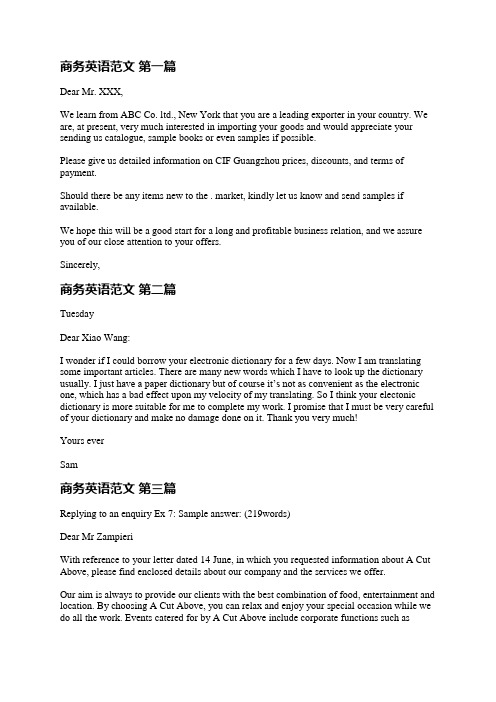
商务英语范文第一篇Dear Mr. XXX,We learn from ABC Co. ltd., New York that you are a leading exporter in your country. We are, at present, very much interested in importing your goods and would appreciate your sending us catalogue, sample books or even samples if possible.Please give us detailed information on CIF Guangzhou prices, discounts, and terms of payment.Should there be any items new to the . market, kindly let us know and send samples if available.We hope this will be a good start for a long and profitable business relation, and we assure you of our close attention to your offers.Sincerely,商务英语范文第二篇TuesdayDear Xiao Wang:I wonder if I could borrow your electronic dictionary for a few days. Now I am translating some important articles. There are many new words which I have to look up the dictionary usually. I just have a paper dictionary but of course it’s not as convenient as the electronic one, which has a bad effect upon my velocity of my translating. So I think your electonic dictionary is more suitable for me to complete my work. I promise that I must be very careful of your dictionary and make no damage done on it. Thank you very much!Yours everSam商务英语范文第三篇Replying to an enquiry Ex 7: Sample answer: (219words)Dear Mr ZampieriWith reference to your letter dated 14 June, in which you requested information about A Cut Above, please find enclosed details about our company and the services we offer.Our aim is always to provide our clients with the best combination of food, entertainment and location. By choosing A Cut Above, you can relax and enjoy your special occasion while we do all the work. Events catered for by A Cut Above include corporate functions such asconversations and Christmas balls and also family celebrations such as birthdays, weddings and anniversaries.A Cut Above offers a variety of services from simply providing a gourmet menu to helping you choose the right venue and organise entertainment. We specialise in using our experience to meet your needs. To help us achieve this aim, we always arrange a meeting with a new client well before the date of any event in order to discuss the various possibilities.As you can appreciate, we are unable to give quotations before our initial briefing with a client as price per head varies with the choice of menu.To arrange a meeting or for any further information, please do not hesitate to contact myself or Elena Polidoro on 01623 713698.A Cut Above looks forward to hearing from you.Yours sincerelySinead Welsh商务英语范文第四篇good morning, my name is jack, it is really a great honor to have this opportunity for a interview, i would like to answer whatever you may raise, and i hope i can make a good performance today, eventually enroll in this prestigious university in september. now i will introduce myself briefly,i am 21 years old,born in heilongjiang province ,northeast of china,and i am curruently a senior student at beijing XX major is packaging i will receive my bachelor degree after my graduation in the past 4 years,i spend most of my time on study,i have passed CET4/6 with an ease.And i have acquired basic knowledge of packaging and publishing both in theory and in practice. besides, i have attend several packaging exhibition hold in Beijing, this is our advantage study here, i have taken a tour to some big factory and company. through these i have a deeply understanding of domestic packaging industry. compared to developed countries such as us, unfortunately, although we have made extraordinary progress since 1978,our packaging industry are still underdeveloped, mess, unstable, the situation of employees in this field are awkard. but i have full confidence in a bright future if only our economy can keep the growth pace still.I guess you maybe interested in the reason itch to law, and what is my plan during graduate study life, i would like to tell you that pursue law is one of my lifelong goal,i like my major packaging and i won\'t give up,if i can pursue my master degree here i will combine law with my former education. i will work hard in thesefields ,patent ,trademark, copyright, on the base of my years study in department of p&p, my character?I cannot describe it well, but i know i am optimistic and confident. sometimes i prefer to stay alone, reading, listening to music, but i am not lonely, i like to chat with my classmates, almost talk everything ,my favorite pastime is valleyball,playing cards or surf online. through college life,i learn how to balance between study and entertainment. by the way, i was a actor of our amazing drama club. i had a few glorious memory on stage. that is my pride.商务英语范文第五篇Good afternoon .I am of great hornor to stand here and introduce myself to you .First ofall ,my english name is ...and my chinese name is ..If you are going to have a jobinterview ,you must say much things which can show your willness to this job ,such as ,it is my long cherished dream to be .and I am eager to get an opportunity to do...and then give some examples which can give evidence to .then you can say something about your hobbies .and it is best that the hobbies have something to do with the job.What is more important is do not forget to communicate with the interviewee,keeping a smile and keeping your talks interesting and funny can contribute to the success.I hope you will give them a wonderful speech .Good luck to you !商务英语范文第六篇DearThank you for your comments.A copy of your letter has been forwarded to the author for his response. I am sure you will be hearing from him in the near future. I am pleased that you found our article informative and hope that you will continue to read our publication. Should you have any comments or questions in the future,please do not hesitate to write to this office.We value our readership and are proud to have you as a member of our family of subscribers. 商务英语范文第七篇GUARANTEEFOR VALUE RECEIVED, the undersigned hereby guarantee absolutely and payment of the within Note and agree to pay all cost of collection,legal expenses and attorneys\' fees,incurred or paid by the holder of the within Note in the collectionand/or enforcement of said Note and the enforcement of this Guaranty.No renewal orextension of said Note, no release orsurrender of any security for said Note or this Guaranty,no release of any person primarily or secondarily liable onsaidNote(including any maker, endorser or guarantor),no delay inthe enforcement of payment of said Note or this Guaranty and no delay oromission in exercising any right or power under said Note on this Guarantyshall affect the liability of any of the undersinged hereunder. The waives presentment, protest,demand, notice of dishonor ordefault,notice of acceptanceof this Guaranty and notice of any kind with respect to said Note or this Guarantyor the performance of the obligation under said Note or Guaranty.________________________(SEAL)________________________(SEAL)商务英语范文第八篇DearEveryone here at [name of firm] was saddened to learn of [name of employee] sudden illness.We know that this came on without any warning and while the proceeds from the group policy insurance coverage will defray a substantial amount of the medical costs, you may have need for some additional financial assistance to see you through this difficult time.Please do not hesitate to call on us if you need our assistance in this area. We consider [name of employee] to be one of our most valuable employees and a fine individual as well and would be most appreciative if you will let him know that we are all thinking of him商务英语范文第九篇DearThis is to inform youthat we have carefully reviewed your estimate on the parking lotrefurbishing. We are planning to contract with you for this work.We are unable to letthis contract immediately, as finalapproval of expenditures of this nature must come from the head office in NewYork.DearWe have received yourletter acknowledging receipt of the items we mailed to you and noticing us tocancel shipment of your order for those items which are back ordered.We will be issuing youa refund as soon as we have completed the necessary paperwork for your account.We would like to takethis opportunity to thank you for shopping through [name] Our new [specify] catalogshould be arriving at your home shortly, and I believe you will be pleased by some of the beautiful choicesour buyers have made this season.Thank you for yourpatience and understanding and for providing us with the opportunity to be ofservice to you.商务英语范文第十篇DearThank you for yourorder. At this time we cannot fill your order due to an unexpectedshipment delay from our overseas suppliers.We will hold yourorder for arrival of the merchandise, and ship shortly thereafter. Unfortunately, we cannot provide you with a specific shipping date at this time.Thank you for youranticipated patience in this matter.商务英语范文第十一篇Dear Sir: June 15, 2001We have discussed your offer of 5% and accept it on the terms quoted. We are prepared to give your product a trial, provided you can guarantee delivery on or before the 20th of September. The enclosed order is given strictly on this condition. We reserve the right of refusal of delivery and/or cancellation of the order after this date.Truly商务英语范文第十二篇Electronic mail,or e-mail for short,is an entirely new way of communication by means of fast,inexpensive,highly efficient and convenient,e-mail is so popular in developed countries that it is difficult to imagine modern life without it.Nowadays, millions of computers all over the world have been connected to form a global network called can send or receive by e-mail a variety of information and documents such as letters,papers, video and audio files to anyone in over 170 countries in a short harriers are not a problem, because internet software is capable of translating your mail into whatever language you want. you can also store,,edit,compile and search your e-maih most importantly,e-mail helps us overcome space and time limitations in communication.With the rapidly growing popularity of computers and the fast expansion of the information highway,wider and wider applications of internet e-mail will be developed and e-mail will soon become an indispensable means of communication.商务英语范文第十三篇Dear Mr ZampieriWith reference to your letter dated 14 June, in which you requested information about A Cut Above, please find enclosed details about our company and the services we offer.Our aim is always to provide our clients with the best possible combination of food, entertainment and location. By choosing A cut Above, you can relax and enjoy your special occasion while we do all the work. Events catered for by A cut Above include corporate functions such as conventions and Christmas balls and also family celebrations such as birthdays, weddings and anniversaries.A Cut Above offers a variety of services from simply providing a gourmet menu to helping you choose the right venue and organise entertainment. We specialise in using our experienceto meet your nees. To help us achieve this aim, we always arrange a meeting with a new client well before the date of any event in order to discuss the various possibilities.As you can appreciate, we are unable to give quotations before our initial briefing with a client as price per head vaires with choice of menu.To arrange a meeting or for any further information, please do not hesitate to contact myself or Elena Polidoro on 0123 4578.A Cut Above look forward to hearing from you.Yours sincerelySinead Walsh商务英语范文第十四篇Gentlemen:This is to inform you that we are unable to make delivery on the above referenced purchase order on the date indicated.We should have our merchandise ready to ship within 10 days of the original delivery date and we hope that you can hold off until that time.We did want to inform you of this delay as soon we were advised in order to give you as much time as possible to make alternate arrangements, if necessary. We can assure you,however, that if your order remains in force we will expedite delivery to you as soon as we have received the merchandise.Please accept our apology for this delay and thank you for your understanding.。
商务英语考试考些什么内容
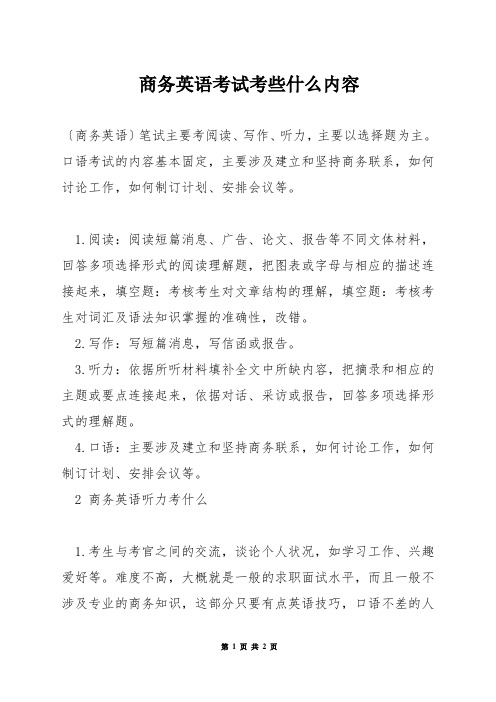
商务英语考试考些什么内容〔商务英语〕笔试主要考阅读、写作、听力,主要以选择题为主。
口语考试的内容基本固定,主要涉及建立和坚持商务联系,如何讨论工作,如何制订计划、安排会议等。
1.阅读:阅读短篇消息、广告、论文、报告等不同文体材料,回答多项选择形式的阅读理解题,把图表或字母与相应的描述连接起来,填空题:考核考生对文章结构的理解,填空题:考核考生对词汇及语法知识掌握的准确性,改错。
2.写作:写短篇消息,写信函或报告。
3.听力:依据所听材料填补全文中所缺内容,把摘录和相应的主题或要点连接起来,依据对话、采访或报告,回答多项选择形式的理解题。
4.口语:主要涉及建立和坚持商务联系,如何讨论工作,如何制订计划、安排会议等。
2 商务英语听力考什么1.考生与考官之间的交流,谈论个人状况,如学习工作、兴趣爱好等。
难度不高,大概就是一般的求职面试水平,而且一般不涉及专业的商务知识,这部分只要有点英语技巧,口语不差的人就能应付。
2.考生就某一商业话题做一分钟的〔演讲〕,难度有点大,但也可以通过背诵模板来进行准备。
3.两位考生讨论一个商业话题。
这部分的准备时间只有一分钟,时间紧,备考难度大。
商务英语学习环境也很重要,身边有人一起学习、一起施行会很好,有一个好老师就更好了。
3 商务英语口语考试考什么1.话题演讲部分在这一部分中,考官会分别给每位考生一张问题卡,上面有三个不同的话题,每个话题下又有几个提示点,考生从三个话题中选择一个进行演讲,并回答考官提出的问题。
考生演讲前,会有一分钟的准备时间,演讲时间为一分钟。
2.话题讨论部分在这一部分中,考官会向两名考生出示一张问题卡,其中有一个话题必须要两名考生通过讨论来完成,话题会有几个提示点,必须要在讨论中覆盖到,考生完成讨论后,考官会分别向考生就讨论中的内容进行提问,考生在讨论前有30秒的时间共同看题,讨论时间为3分钟。
商务英语专业术语
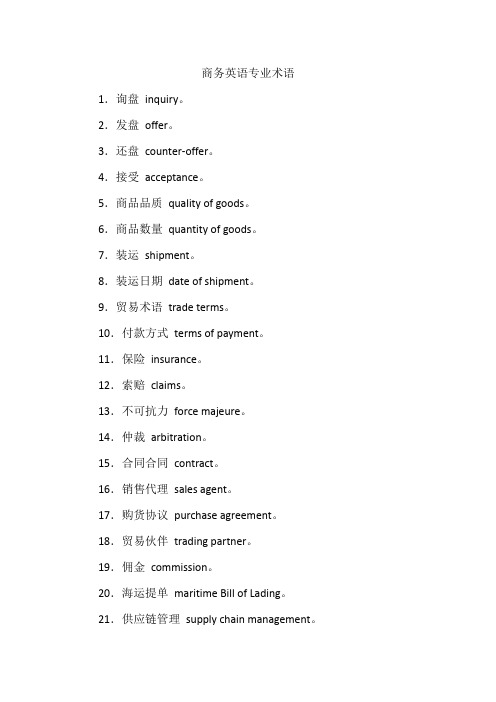
商务英语专业术语1.询盘inquiry。
2.发盘offer。
3.还盘counter-offer。
4.接受acceptance。
5.商品品质quality of goods。
6.商品数量quantity of goods。
7.装运shipment。
8.装运日期date of shipment。
9.贸易术语trade terms。
10.付款方式terms of payment。
11.保险insurance。
12.索赔claims。
13.不可抗力force majeure。
14.仲裁arbitration。
15.合同合同contract。
16.销售代理sales agent。
17.购货协议purchase agreement。
18.贸易伙伴trading partner。
19.佣金commission。
20.海运提单maritime Bill of Lading。
21.供应链管理supply chain management。
22.跨国企业multinational corporation。
23.对外贸易foreign trade。
24.关税tariff。
25.贸易制裁trade sanctions。
26.贸易战trade war。
27.经济全球化economic globalization。
28.跨境电商cross-border e-commerce。
29.互联网金融internet finance。
30.一带一路Belt and Road Initiative。
31.贸易展览会trade fair。
32.商务洽谈business negotiation。
33.市场营销marketing。
34.品牌建设brand building。
35.企业文化corporate culture。
36.人力资源management personnel。
37.职位招聘job recruitment。
38.绩效评估performance appraisal。
商务英语怎么说

商务英语怎么说
商务英语的英语:business English。
business,n. 商业,交易,生意。
例句:I wish I knew more abut business English.我真希望我多知道些商务英语。
参考例句:
I wish I knew more abut business English.
我真希望我多知道些商务英语。
business是什么意思:
n. 商业,交易,生意;公司,商店;事情;职责
Be engaged in; be Busy in
从事于
to sit for business
因公滞留
As Busy as a bee
(象蜜蜂)忙忙碌碌的
Monkey Business
耍些骗人的把戏、捣鬼
depressed business
不景气的生意
english是什么意思:
n. 英语;英格兰人
adj. 英格兰的;英格兰人的;英国的;英国人的;英语的A degree in English does not qualify you to teach English.
你的英语程度教书不够格。
John tutored the child in English.
约翰辅导那孩子学英语。
His knowledge of English is fair.
他的英语水平尚可。
Her English is indifferent.
她的英文很一般。
This is not in agreement with standard English usage.
这不符合标准英式用法。
商务英语:10个必备商务用语
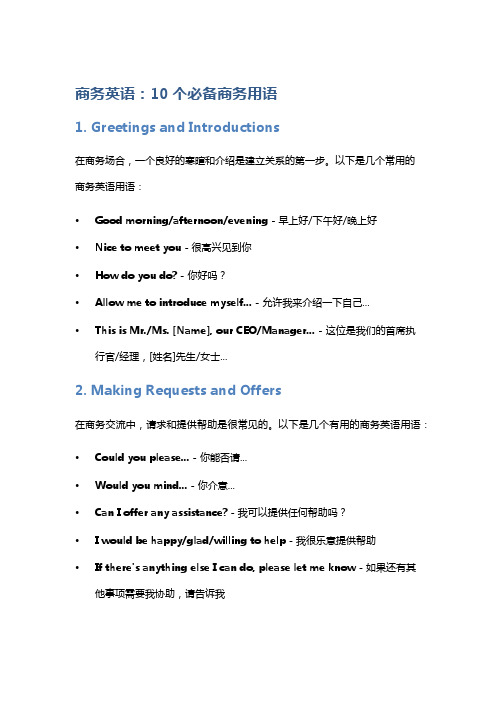
商务英语:10个必备商务用语1. Greetings and Introductions在商务场合,一个良好的寒暄和介绍是建立关系的第一步。
以下是几个常用的商务英语用语:•Good morning/afternoon/evening - 早上好/下午好/晚上好•Nice to meet you - 很高兴见到你•How do you do? - 你好吗?•Allow me to introduce myself... - 允许我来介绍一下自己...•This is Mr./Ms. [Name], our CEO/Manager... - 这位是我们的首席执行官/经理,[姓名]先生/女士...2. Making Requests and Offers在商务交流中,请求和提供帮助是很常见的。
以下是几个有用的商务英语用语:•Could you please... - 你能否请...•Would you mind... - 你介意...•Can I offer any assistance? - 我可以提供任何帮助吗?•I would be happy/glad/willing to help - 我很乐意提供帮助•If there's anything else I can do, please let me know - 如果还有其他事项需要我协助,请告诉我安排会议时,需要使用适当的商务用语来表达你的意图和计划。
以下是几个常见的商务英语用语:•I'd like to arrange a meeting - 我想安排一次会议•Could we schedule a meeting for [date/time]? - 我们能否安排在[日期/时间]开会?•Can you please check your availability? - 请您确认您的时间是否方便?•Let's meet at [location] - 让我们在[地点]见面•Would it be possible to reschedule the meeting? - 是否可以重新安排会议?4. Making Invitations在商务场合,邀请某人出席活动或参加会议是很常见的。
商务英语试卷及参考答案

商务英语试卷及参考答案商务英语试卷一、选择题1、In business negotiations, which of the following is the most effective opening gambit? A. Aggressive posturing B. Passive concession C. Tactical maneuvering D. Bold assertion2、Which of the following is NOT an example of business etiquette?A. Dressing professionallyB. Handling emails appropriatelyC. Maintaining a positive attitude during meetingsD. Cursing in front of clients3、Which of the following best defines the concept of "soft skills" in business? A. Technical abilities related to a specific job B. Abilities to handle interpersonal relationships effectively C. Abilities to perform complex analytical tasks D. Abilities to manage and lead teams4、In a meeting, a colleague starts a tirade about a supplier who has disappointed them. The best way to handle this situation is to: A. Interrupt and redirect the conversation B. Agree with the colleague and pile on the criticism C. Listen patiently andevaluate the supplier's performance yourself D. Remain silent and avoid getting involved5、Which of the following best represents the concept of "win-win" in business? A. A situation where one party benefits more than the other B. A situation where both parties benefit equally C. A situation where neither party benefits D. A situation where both parties benefit as a result of conflict二、简答题6、Please explain the concept of "bartering" and provide a real-life example.61、How can businesses use social media effectively to promote their products or services?611、Describe a challenging business situation you have faced and how you overcame it.6111、What are the primary goals of a business letter? Provide an example of a well-written business letter.61111、What are some common mistakes made in business emails and how can they be avoided?参考答案一、选择题1、正确答案是C. Tactical maneuvering。
商务英语相关词汇解析
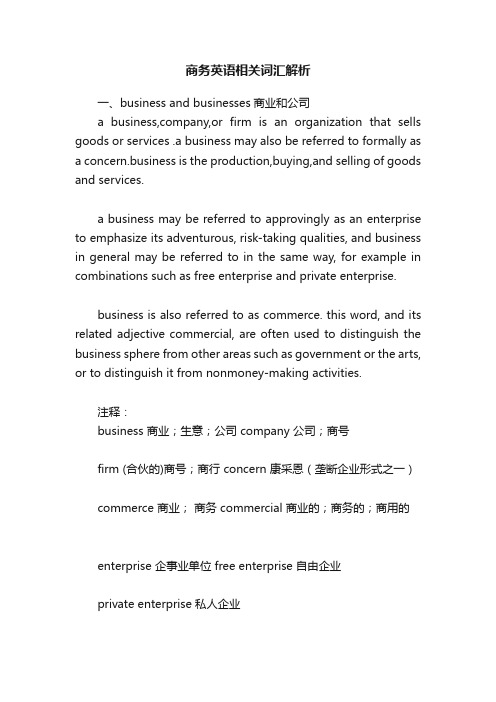
商务英语相关词汇解析一、business and businesses商业和公司a business,company,or firm is an organization that sells goods or services .a business may also be referred to formally as a concern.business is the production,buying,and selling of goods and services.a business may be referred to approvingly as an enterprise to emphasize its adventurous, risk-taking qualities, and business in general may be referred to in the same way, for example in combinations such as free enterprise and private enterprise.business is also referred to as commerce. this word, and its related adjective commercial, are often used to distinguish the business sphere from other areas such as government or the arts, or to distinguish it from nonmoney-making activities.注释:business 商业;生意;公司 company 公司;商号firm (合伙的)商号;商行 concern 康采恩(垄断企业形式之一)commerce 商业;商务 commercial 商业的;商务的;商用的enterprise 企事业单位 free enterprise 自由企业private enterprise 私人企业二、from multinationals to small firms 从跨国公司到小型企业large companies are referred to as corporations, especially in the united states. corporate is used to describe things relating to a corporation, or to corporations in general, in expressions like the ones in the next exercise. large companies operating in many countries are multinationals.big business can refer to large business organizations or to any business activity that makes a lot of money. small companies are referred to as small businesses or small firms.unlike some languages, english does not have an everyday term for small and medium-sized companies, apart from this rather clumsy expression.注释:corporation 大公司;股份有限公司 corporate 法人;团体multinational 跨国的;多国的 big business 大型企业;大公司small and medium sized companies中小规模的公司small business 小公司 small firm 小公司三、industries and sectors 工业及其部门businesses may be classified according to which industry they are in: for example construction, oil, banking, food.sector is sometimes used to mean industry in the same way, particularly by specialists such as financial journalists, but it is more often used to talk about different parts of the economy in combinations such as public sector and private sector, or about types of business in expressions like service sector and manufacturing sector.注释:industry 工业;产业 sector 部门;部分public sector 公共部门 private sector 私营部门manufacturing sector 制造部门 service sector 服务部门四、public sector and private 公共部门和私营部门when a private company is bought by the state and brought into the public sector, it is nationalized in a process of nationalization. a nationalized company is state-owned. when the state returns a company to the private sector in a sell-off, it is privatized. this is privatization.the first to be sold off in a privatization program are often the companies responsible for the public supply of electricity,water and gas: the utilities.注释:nationalized 国有化的 nationalization 国有化privatized 私有化的 privatization 私有化state-owned 国有的 sell off 廉价出清utilities 公用事业;公用事业部门五、stakes 份额;股份if company a owns shares or equity in company b, a has or holds a stake, holding or shareholding in b. if a owns less than half the shares in b, it has a minority stake in b.if a owns more than half the shares in b, it has a majority stake or controlling stake in b. if you have shares in a company you are a shareholder.注释:shares/stake 份额;股份 equity 股份;产权;普通股票holding 持有;股票额 shareholding 持有股票数shareholder 股东 hold a stake 持有份额majority stake 大股东(50%以上) controlling stake 大股东minority stake 小股东原作者: mba100商务英语重点词汇(2)一、parents and sisters 母公司和姐妹公司a holding or holding company is one that holds stakes in one or more subsidiaries. if it owns all the shares in a subsidiary, the subsidiary is a wholly-owned one.a holding company´s relationship to its subsidiaries is that of parent company, and the subsidiaries relationship to each other is that of sister companies. a holding and its subsidiaries form a group.a conglomerate is a group containing a lot of different companies in different businesses. journalists also refer to large groups as giants.注释:holding company 控股公司 subsidiary 子公司wholly-owned subsidiary 全资子公司 parent company 母公司sister company 姐妹公司 group 集团公司conglomerate 联合大企业giant 大企业;企业巨人(新闻用语)二、predators,raiders,and white knights 掠夺者、抢劫者和善意合作者the takeover process is often described in terms of one animal hunting another: a company or individual seeking to take over another company may be referred to as a predator, and the target company as the prey. predators are also referred to as raiders or corporate raiders.a company wishing to resist, ward off, or fend off being taken over has a number of options. it may devise plans that give existing shareholders special rights, or it may make itself less attractive to bidders by selling off a valuable part of the company, or holding on to an unattractive one. actions like these are poison pills.or it may persuade a friendly partner, a white knight, to take a stake in the company, thus preventing a complete takeover by a hostile bidder. bidders may agree to withdraw their bid if paid enough money for the shares they hold in the target company. this is green mail.注释:predator 掠夺者(恶意吞并其它企业) prey 猎物(被恶意并购的企业)raider 掠夺者(恶意并购其它企业) corporate raider 合伙掠夺者fend off a bid 阻止收购 ward off a bid 阻止收购poison bill毒药(公司通过给予股东某些特权、或卖掉部分有价值资产,而持有或购进价值不大的资产,从而减少自己对并购公司的吸引力)white knight指购买公司部分股份以免遭兼并企业完全兼并的善意和或者。
商务英语电子课件完整版

process? 5. How to explain the candid comments?
desire n. 欲望 vt.想要 opportunity n. 机会 applicant n. 申请人 potential adj. 潜在的 enthusiasm n.热情,热心 Résumé n. 简历 clarification n. 澄清 conservatively adv. 保守 initially adv. 最初, 首先 overbearing adj. 傲慢的,压倒一切的; v.
Unit1 Job-Hunting
Learning Objective
After studying this chapter you will be able to: Know the main tips of building virtual store Understanding the ways of getting core
压住,否定 executive v. 执行
Text A How to Crack a Job Interview successfully
Questions for Discussion
1. What is the function of a job interview?
2. Which factors are involved in a successful job interview?
商务英语的概念

商务英语的概念English: Business English refers to the specialized language used in the context of business, finance, international trade, and other related fields. It is essential for professionals working in a corporate setting to effectively communicate with colleagues, clients, and partners around the world. Business English encompasses various skills such as writing emails, conducting meetings, negotiating contracts, presenting reports, and engaging in social interactions. It also includes knowledge of specific business terminology, etiquette, and cultural nuances that are crucial for building successful relationships and conducting business transactions. Proficiency in Business English not only enhances one's communication abilitiesbut also opens up opportunities for career advancement and global networking.中文翻译: 商务英语指的是在商业、金融、国际贸易及其他相关领域使用的专门语言。
商务英语专业主修课程
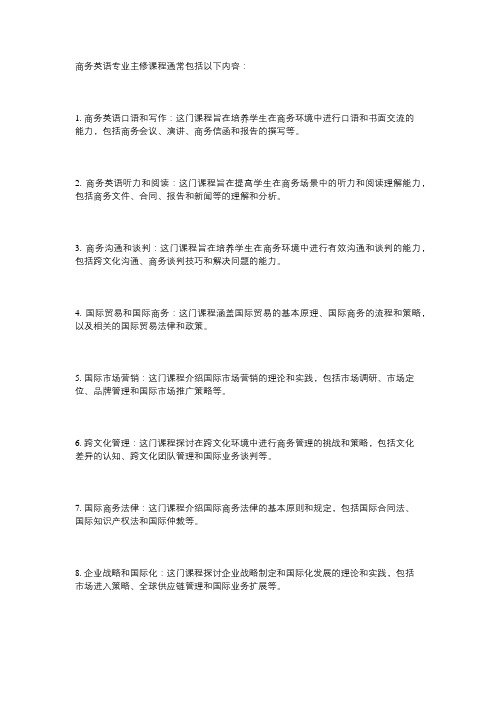
商务英语专业主修课程通常包括以下内容:
1. 商务英语口语和写作:这门课程旨在培养学生在商务环境中进行口语和书面交流的
能力,包括商务会议、演讲、商务信函和报告的撰写等。
2. 商务英语听力和阅读:这门课程旨在提高学生在商务场景中的听力和阅读理解能力,包括商务文件、合同、报告和新闻等的理解和分析。
3. 商务沟通和谈判:这门课程旨在培养学生在商务环境中进行有效沟通和谈判的能力,包括跨文化沟通、商务谈判技巧和解决问题的能力。
4. 国际贸易和国际商务:这门课程涵盖国际贸易的基本原理、国际商务的流程和策略,以及相关的国际贸易法律和政策。
5. 国际市场营销:这门课程介绍国际市场营销的理论和实践,包括市场调研、市场定位、品牌管理和国际市场推广策略等。
6. 跨文化管理:这门课程探讨在跨文化环境中进行商务管理的挑战和策略,包括文化
差异的认知、跨文化团队管理和国际业务谈判等。
7. 国际商务法律:这门课程介绍国际商务法律的基本原则和规定,包括国际合同法、
国际知识产权法和国际仲裁等。
8. 企业战略和国际化:这门课程探讨企业战略制定和国际化发展的理论和实践,包括
市场进入策略、全球供应链管理和国际业务扩展等。
此外,商务英语专业还可能包括实习和毕业论文等实践和研究项目,以帮助学生将所学知识应用于实际情境中,并提高其研究和分析能力。
具体的课程设置可能因学校和课程设置而有所不同。
商务英语

abroad adv. 在国外,出国,广泛流传absence n. 缺席,离开absent adj. 不在,不参与absenteeism n.(经常性)旷工,旷职absorb v. 吸收,减轻(困难等)作用或影响abstract n. 摘要access n. 接近(或进入)的机会,享用权v.获得使用计算机数据库的权利accommodation n.设施,住宿account n.会计账目accountancy n会计工作accountant n.会计accounts n.往来账目account for解释,说明account executive n.(广告公司)客户经理accruals n. 增值,应计achieve v. 获得或达到,实现,完成acknowledge v. 承认,告知已收到(某物),承认某人acquire v.获得,得到acquisition n收购,被收购的公司或股份acting adj. 代理的activity n.业务类型actual adj. 实在的,实际的,确实的adapt v. 修改,适应adjust v.整理,使适应administration 实施,经营,行政administer v.管理,实施adopt v. 采纳,批准,挑选某人作候选人advertise v. 公布,做广告ad n.做广告,登广告advertisement n.出公告,做广告advertising n.广告业after-sales service n.售后服务agenda n.议事日程agent n.代理人,经纪人allocate v.分配,配给amalgamation n合并,重组ambition n. 强烈的欲望,野心amortize v. 摊还analyze v 分析,研究analysis n.分析,分析结果的报告analyst n. 分析家,化验员annual adj.每年的,按年度计算的annual general meeting (AGM)股东年会anticipate v. 期望anticipated adj. 期待的appeal n.吸引力apply v. 申请,请求;应用,运用applicant n. 申请人application n.申请,施用,实施appointee n.被任命人appraisal n.估量,估价appreciate v. 赏识,体谅,增值appropriate v.拨出(款项)approve v. 赞成,同意,批准aptitude n.天资,才能arbitrage n.套arbitration n.仲裁arrears n. 欠账assemble v.收集,集合assembly line n. 装配线,流水作业线assess v. 评定,估价asset n. 资产current asset n.流动资产fixed asset n.固定资产frozen asset n. 冻结资产intangible assets n.无形资产liquid assets n.速动资产tangible assets n.有形资产assist v. 援助,协助,出席audit n. 查账,审计automate v. 使某事物自动操作average n.平均,平均水准awareness n. 意识;警觉backing n.财务支持,赞助backhander n. 贿赂backlog n. 积压(工作或订货)bad debt 死账(无法收回的欠款)balance n. 收支差额,余额balance of payments n. 贸易支付差额balance sheet n. 资产负债表bankrupt adj.破产的bankruptcy n.破产bank statement n. 银行结算清单(给帐户的),银行对账单bar chart n. 条形图,柱状图bargain v. 谈判,讲价base n. 基地,根据地batch n. 一批,一组,一群batch production批量生产bear market n.熊市beat v. 超过,胜过behave v. 表现,运转behavior n. 举止,行为,运转情况below-the-line advertising 线下广告,尚未被付款的广告benchmark 衡量标准benefit n. 利益,补助金,保险金得益fringe benefits附加福利Sickness benefit 疾病补助费bid n. 出价,投标takeover bid n. 盘进(一个公司)的出价bill n.账单,票据billboard n. (路边)广告牌,招贴板black adj.违法的in the black 有盈余,贷方black list黑名单,禁止贸易的(货物、公司及个人)名单black Monday n.黑色星期一,指1987年10月国际股票市场崩溃的日子blue chips蓝筹股,绩优股blue-collar adj.蓝领(工人)的Board of Directors n.董事会Bond n.债券Bonus n. 津贴,红利books公司账目book value n. 账面价值,(公司或股票)净值bookkeeper n. 簿记员,记账人boom n. 繁荣,暴涨boost v. 提高,增加,宣扬bottleneck n. 瓶颈,窄路,阻碍bottom adj. 最后的,根本的 v. 到达底部,建立基础bounce v. 支票因签发人无钱而遭拒付并退回brainstorm n./v.点子会议,献计策, 头脑风暴branch n. 分支,分部brand n. 商标,品牌brand leader n.占市场最大份额的品牌,名牌brand loyalty n.(消费者)对品牌的忠实break even v. 收支相抵,不亏不盈break even point 收支相抵点, 盈亏平衡点breakthrough n. 突破brief n. 摘要brochure n. 小册子broker n. 经纪人,代理人bull market 牛市budget n. 预算bulk n. 大量(货物)adj. 大量的bust adj. 破了产的buyout n. 买下全部产权CAD(=Computer Aided Design) 计算机辅助设计call n. 打电话call on v. 呼吁,约请,拜访campaign 战役,运动candidate n.求职者,候选人canteen n. 食堂canvass v. 征求意见,劝说capacity n. 生产额,(最大)产量caption n. 照片或图片下的简短说明capital n. 资本,资金capture v. 赢得cash n. 现金,现付款v. 兑现cash flow n. 现金流量case study n. 案例分析catalogue n. 目录,产品目录catastrophe n. 大灾难,大祸CEO=Chief Executive Officer(美)总经理chain n. 连锁店challenger n.挑战者channel n.(商品流通的)渠道charge n. 使承担,要(价),把…记入…chart n. 图表checkout n.付款台chief adj. 主要的,首席的,总的CIF, c.i.f.成本保险费加运费circular n.传阅的小册子(传单等)circulate v.传阅claim n./v.要求,索赔client n.委托人,顾客cold adj. 没人找上门来的,生意清淡的commercialize v.使商品化commission n.佣金commitment n.承诺commodity 商品,货物company n. 公司limited (liability) company 股份有限公司public limited company (plc) n.股票上市公司compensate v. 补偿,酬报compensation n补偿,酬金compete v.比赛,竞争competition n.比赛,竞争competitor n.竞争者,对手competitive adj.竞争性的component n. 机器元件、组件、部件,部分concentrated marketing n. 集中营销策略condition n.条件,状况configuration n.设备的结构、组合conflict n. 冲突,争论conglomerate n. 综合商社,多元化集团公司consolidate v. 账目合并consortium n.财团constant adj. 恒定的,不断的,经常的consultant n. 咨询人员,顾问,会诊医生consumables n.消耗品consumer durables n.耐用消费品(如:洗衣机)consumer goods n.消费品,生活资料contingency n. 意外事件continuum n.连续时间contract n. 合同,契约contractor n.承办商,承建人contribute v. 提供,捐献contribution n贡献,捐献,税conversion n. 改装,改造conveyor n. 运送,传递,转让core time n.(弹性工作制的)基本上班时间(员工于此段时间必须上班,弹性只对除此以外的时间有效)cost n. 成本 fixed costs固定成本running costs 日常管理费用variable costs可变成本cost-effective adj.合算的,有效益的costing n.成本计算,成本会计credit n.赊购,赊购制度credit control 赊销管理(检查顾客及时付款的体系)letter of credit信用证credit limit赊销限额credit rating 信贷的信用等级,信誉评价creditor n.债权人,贷方creditworthiness n.信贷价值,信贷信用crisis n.危机,转折点critical adj. 关键的*criticalpath analysis n. 关键途径分析法currency n.货币,流通current adj. 通用的,现行的Current account 往来账户,活期(存款)户current assets n.流动资产current liabilities n. 流动负债customize v. 按顾客的具体要求制造(或改造等);顾客化cut-throat adj. 残酷的,激烈的cut-price a. 削价(出售)的CV(=curriculum vitae)n. 简历,履历cycle time n.循环时间damages n.损害,损失deadline n. 最后期限deal n. 营业协议,数量v. 交易dealer n. 商人debit n. 借方,欠的钱v.记入账户的借方debt n. 欠款,债务to get into debt 负债to be out of debt 不欠债to pay off a debt 还清债务debtor n.债务人aged debtors 长期债务人declare v.申报,声明decline n./v. 衰退,缓慢,下降decrease v. 减少deduct v.扣除,减去default n. 违约,未履行defect n. 缺陷defective adj.有缺点的defer v. 推迟deferred payments n. 延期支付deficit n. 赤字delivery cycle n.交货周期demand management n.需求规划decorticated adj. 消极的,冷谈的deposit n. 储蓄,预付(定金)depot n. 仓库depreciate v.贬值,(对资产)折旧depressing adj. 令人沮丧的deputy n. 代理人,副职,代理devalue v. 货币贬值(相对于其它货币)diet n. 饮食,食物,特种饮食differentiation n. 区分,鉴别dimensions n. 尺寸,面积,规模direct v管理,指导director n.经理,主管Managing Director n.总经理direct cost n. 直接成本direct mail n.(商店为招揽生意而向人们投寄的)直接邮件direct selling n.直销,直接销售directory n.指南,号码簿discount n.折扣,贴现dismiss v.让……离开,打发走dismissal n. 打发走dispatch n./v. 调遣display n./v. 展出,显示dispose v.安排,处理(事务)dispose of 去掉,清除distribution n分配,分发,分送产品diversify v.从事多种经营;多样化divest v.剥夺dividend n. 股息,红利,年息division n. 部门dog n. 滞销品down-market a./ad.低档商品的down-time/downtime n. 设备闲置期DP(=Data Processing) n. 计算机数据处理,计算机数据处理部门dramatic adj. 戏剧性的drive积极性,能动due adj. 应付的,预期的dynamic 有活力的earnings n. 工资,收入efficiency n. 效率endorse v.背书,接受engage v. 雇用entitle v. 授权entitlement n.应得的权利holiday entitlement n. 休假权equity n.股东权益equity capital股本equities 普通股,股estimated demand n.估计需求evaluate v. 估价,评价eventual adj.最终exaggerate v. 夸张exceed v. 超过exhibit n.展览,表现expenditure n花费,支出额expense n.费用,支出expense account n. 费用帐户expenses n.费用,业务津贴expertise n.专长,专门知识和技能exposure n.公众对某一产品或公司的知悉;广告所达到的观众总数facilities n.用于生产的设备、器材facilities layout n.设备的布局规划、计划facilities location n.设备安置factoring n.折价购买债券fail-safe system n.安全系统feasibility study n.可行性研究feedback n. 反馈,反馈的信息field n.办公室外边,具体业务file n. 文件集,卷宗,档案,文件v. 归档fill v. 充任finance n. 资金,财政v. 提供资金financial adj. 财政的financing n. 提供资金,筹借资金finished goods n. 制成品firm n. 公司fire v. 解雇fix v. 确定,使固定在fix up v. 解决,商妥fiscal adj. 国库的,财政的flagship n. 同类中最成功的商品,佼佼者flexible adj. 有弹性的,灵活的flextime n. 弹性工作时间制flier(=flyer) n. 促销传单float v. 发行股票flop n. 失败flow shop n. 车间fluctuate v. 波动,涨落,起伏FOB, f.o.b n. 离岸价follow-up n. 细节落实,接连要做的事forecast v. 预测four P's 指产品produce、价格price、地点place、促销promotionframework n. 框架,结构franchise n. 特许经销权v.特许经销 franchisee n.特许经营人franchiser n.授予特许经营权者fraud n. 欺骗freebie n.(非正式的)赠品,免费促销的商品freelance n.& adj. 自由职业者(的)funds n. 资金,基金futures n. 期货交易gap n. 缺口,空隙gearing n. 配称(即定息债务与股份资本之间的比率)gimmick n. 好主意,好点子goal n. 目标going adj. 进行的,运转中的going rate n. 产品的市场价格goods n. 货物,商品goodwill n. 声誉go public v. 首次公开发行股票grapple with v. 与……搏斗,尽力解决grievance n. 申诉,抱怨gross adj. 总的,毛的gross margin n. 毛利率gross profit n. 毛利gross yield n. 毛收益gradually adv. 逐渐地group n. (由若干公司联合而成的)集团grow v. 增长,扩大growth n. 增长,发展guarantee n. 保证,保单guidelines n. 指导方针,准则hand in v. 呈送hand in one's notice 递交辞呈handle v. 经营hands on adj. 有直接经验的hard sell n. 强行推销hazard n. 危险,危害行为head n. 主管,负责health and safety n. 健康和安全hedge n. 套期保值hidden adj. 隐藏的,不明显的hierarchy n. 等级制度,统治集团,领导层hire v. 雇用hire purchase n. 分期付款购物法hit v. 击中,到达holder n. 持有者holding company n. 控股公司hostile adj. 不友好的,恶意的HRD n. 人力资源发展部human resources n. 人力资源hype n. 天花乱坠的(夸张)广告宣传impact n. 冲击,强烈影响implement v. 实施,执行implication n 隐含意义incentive n. 刺激;鼓励income n. 工资或薪金收入,经营或投资的收入earned income 劳动收入,劳动所得unearned income 非劳动收入,投资所得increment v. 定期增加incur v 招致,承担indemnity n. 偿还,赔偿index n. 指数,索引retail price index 零售价格指数indirect costs n. 间接成本induction n. 就职industrial adj. 工业的industrial action n.(罢工、怠工等)劳工行动industrial relations n. 劳资关系inefficiency n. 低效率,不称职inflate v. 抬高(物价),使通货等)膨胀inflation n. 通货膨胀infringe v. 违法,违章initial adj. 初步的innovate v. 革新input n. 投入insolvent adj. 无清偿力的installment n. 部分,分期付款insure v. 给……保险,投保insurance n. 保险interest n. 利息,兴趣interest rate n. 利率interim n. 中期,过渡期间intermittent production n. 阶段性生产interview n./v. 面试interviewee n. 被面试的人interviewer n. 主持面试的人,招聘者introduce v. 介绍,提出inventory n. 库存buffer inventory 用于应付突发性需求的存货capacity inventory 用于将来某时使用的存货cycle inventory n. 循环盘存decoupling inventory保险性存货(以应付万一)finished goods inventory制成品存货(盘存)pipeline inventory n. 在途存货raw materials inventory n. 原材料存货work-in-progress inventory在制品盘存(存货)invest v. 投资investment n. 投资investor n. 投资者invoice n. 发票 v. 给(某人)开发票irrevocable adj. 不可撤消的,不能改变的issue n. 发行股票rights issue n. 优先认股权IT=Information Technology 信息技术item n. 货物,条目,条款job n. 工作job description 工作说明,职务说明job lot n. 一次生产的部分或少数产品job mobility 工作流动job rotation 工作轮换job satisfaction 工作的满意感(自豪感)job shop n. 专门车间jobbing n. 为一次性的或小的订货需求而特设的生产制度joint adj. 联合的joint bank account(几人的)联合银行存款账户journal n. 专业杂志jurisdiction n. 管辖(权)junk bonds n. 低档(风险)债券,垃圾债券junk mail n.(未经收信人要求的)直接邮寄的广告宣传just-in-time n. 无库存制度key adj. 主要的,关键的knockdown adj. (价格)很低的know-how n. 专门技术label n. 标签,标牌v.加标签,加上标牌labor n. 劳动,工作,劳动力labor market 劳动力市场labor relations 劳资关系labor shortage 劳动力短缺launch v.推出一种新产品n. 新产品的推出lay-off/layoff n./v. 临时解雇layout n. 工厂的布局lead v. 领先,领导lead time n. 完成某项活动所需的时间leaflet n. 广告印刷传单lease n. 租借,租赁物legal adj. 合法的lend v. 出借,贷款lessee n. 承租人lesser n. 出租人ledger n. 分类帐nominal ledger n. 记名帐purchase ledger n. 进货sales ledger n. 销货帐leverage n. 杠杆比率liability n. 负债liabilities n. 债务license n. 许可证license v. 许可,批准life cycle n. 寿命周期likely adj. 可能的line process 流水线(组装)link n. 关系,联系,环liquid adj. 易转换成现款的liquidate v. 清算liquidity n. 拥有变现力liquidation n. 清理(关闭公司),清算liquidator n. 清算人,公司资产清理人listed adj. 登记注册的listing n. 上市公司名录literature n. (说明书类的)印刷品,宣传品litigate v. 提出诉讼loan n./v. 贷款,暂借logo n. 企业的特有标记lose v. 亏损loser n. 失败者loss n. 损失lot n. 批,量loyalty n. 忠诚,忠实magazine n. 杂志,期刊mail shot n. 邮购maintain v. 维持,保持maintenance n. 维持,坚持major adj. 重大的,主要的,较大的majority shareholding 绝对控股make n. 产品的牌子或型号make-to-order adj. 根据订货而生产的产品make-to-stock adj. 指那些在未收到订货时就已生产了的产品management n. 管理,管理部门middle management n. 中层管理人员senior management n. 高层管理人员managerial adj. 管理人员的,管理方面的manager n. 经理plant manager n. 工厂负责人line manager n. 基层负责人staff manager n. 部门经理助理management accounts n. 管理帐目matrix management n. 矩阵管理management information system(MIS) n. 管理信息系统manning n. 人员配备manpower n. 劳动力manpower resources n. 劳动力资源manual adj. 体力的,人工的,蓝领的manufacture v. (用机器)制造manufacturer n. 制造者(厂、商、公司)manufacturing adj. 制造的manufacturing industry 制造业margin n. 利润gross margin n. 毛利率net margin n. 净利润mark-up v. 标高售价,加价market n. 市场;产品可能的销量down market adv./ adj. 低档商品地/的up market adj./adv. 高档商品的/地marketing mix n. 综合营销策略,指定价、促销、产品等策略的配合market leader n. 市场上的主导公司market niche n. 小摊位,专业市场的一个小部分market penetration n. 市场渗入market segmentation 市场划分market share n. 市场占有率,市场份额mass-marketing n. 大众营销术master production schedule n.主要生产计划material requirements planning(MRP) n.计算生产中所需材料的方法materials handling n. 材料管理,材料控制maximize v. 使增至最大限度、最大化measure n. 措施,步骤media n. 新闻工具,传媒mass media 大众传媒(如电视、广播、报纸等)merchandising n. (在商店中)通过对商品的摆放与促销进行经营merge v. 联合,合并merger n. (公司,企业等的)合并merit n. 优点,值得,应受method study n. 方法研究middleman n. 中间人,经纪人full milk n. 全脂牛奶skimmed milk n. 脱脂乳minimize v. 使减至最小限度,最小化mission n. 公司的长期目标和原则mobility n. 流动性,可移性moderately adv. 中等地,适度地monopoly n. 垄断,独占mortgage n./v. 抵押motivate v. 激励,激发……的积极性motivated adj. 有积极性的motivation n. 提供动机,积极性,动力motive n. 动机negotiate v. 谈判negotiable adj. 可谈判的,可转让的net adj. 净的,纯的network n. 网络niche n. 专业市场中的小摊位notice n. 通知,辞职申请,离职通知objective n. 目标,目的obsolete adj. 过时的,淘汰的,废弃的offer n. 报价,发盘offer v. 开价off-season adj./adv. 淡季的off-the-shelf adj. 非专门设计的off-the-peg adj. 标准的,非顾客化的opening n. 空位operate v. 操作,经营,管理operating profits营业利润operations chart n.经营(管理)表operations scheduling n. 生产经营进度表opportunity n. 机会optimize v. 优化option n. 选择权share option n. 期权organigram n. 组织图organization chart n. 公司组织机构图orient v. 定向,指引orientation n. 倾向,方向;熟悉,介绍情况outcome n. 结果outlay n. 开销,支出,费用outlet n. 商店a retail outlet 零售店outgoings n. 开支,开销outlined adj. 概括,勾勒的草图output n. 产量outsource v. 外购产品或由外单位制做产品outstanding adj. 未付款的,应收的over-demand n. 求过于供overdraft n. 透支overdraft facility 透支限额overdraw v. 透支overhead costs n. 营业成本overheads n. 企业一般管理费用overpay n. 多付(款)overtime n. 加班overview n. 概述,概观owe v. 欠钱,应付p.a.(=per annum) n. 每年packaging n. 包装物;包装parent company n. 母公司,总公司part-time adj. 部分时间工作的,业余的participate v. 参加,分享 (in) partnership n. 合伙(关系),合伙,合伙企业patent n. 专利pay n. 工资,酬金v. 付钱,付报酬take-home pay 实得工资payroll n. 雇员名单,工资表peak n. 峰值,顶点penetrate v. 渗透,打入(市场)penetration n. 目标市场的占有份额pension n. 养老金,退休金perform v. 表现,执行performance n. 进行,表现工作情况performance appraisal n. 工作情况评估perk n. 额外待遇(交通、保健、保险等)personnel n. 员工,人员petty cash n. 零用现金phase out n. 分阶段停止使用pick v. 提取生产用零部件或给顾客发货picking list n. 用于择取生产或运输订货的表格pie chart n. 饼形图pilot n. 小规模试验pipeline n. 管道,渠道plant capacity n. 生产规模,生产能力plot v. 标绘,策划plough back n. 将获利进行再投资point of sale (POS) n. 销售点policy n. 政策,规定, 保险单portfolio n. (投资)组合portfolio management n. 组合证券管理post n. 邮件,邮局;职位position n. 职位potential n. 潜在力,潜势power n. 能力purchasing power 购买力PR=Public Relations 公共关系preference shares n. 优先股price n. 价格market price 市场价,市价retail price 零售价probation n. 试用期product n. 产品production cycle n. 生产周期production schedule n. 生产计划product life cycle n. 产品生命周期product mix n.产品组合(种类和数量的组合)productive adj. 生产的,多产的profile n. 简介形象特征profit n. 利润operating profit n. 营业利润profit and loss account n. 损益账户project v. 预测promote v . 推销promotion n. 提升,升级proposal n. 建议,计划prospect n. 预期,展望prospectus n. 计划书,说明书prosperity n. 繁荣,兴隆prototype n. 原型,样品publicity n. 引起公众注意public adj. 公众的,公开的go public 上市public sector 公有企业publicity n. 公开场合,名声,宣传publics n.公众,(有共同兴趣的)人或社会人士punctual adj. 准时的punctuality n. 准时purchase v. & n. 购买purchaser n. 买主,采购人QC(=Quality Circle) n. 质检人员qualify v. 有资格,胜任qualified adj. 有资格的,胜任的,合格的qualification n. 资格,资格证明quality n. 质量quality assurance n. 质量保证quality control 质量控制,质量管理quarterly adj./adv. 季度的,按季度questionnaire n. 调查表,问卷quote n. 报价,股票牌价quotation n. 报价,股票牌价R&D Research and Development 研究与开发radically adv. 根本地,彻底地raise n.(美)增薪v.增加,提高;提出,引起range n. 系列产品rank n./v. 排名rapport n. 密切的关系,轻松愉快的气氛rate n. 比率,费用fixed rate 固定费用,固定汇率going rate 现行利率,现行汇率rating 评定结果ratio n. 比率rationalize v. 使更有效,使更合理raw adj. 原料状态的,未加工的raw material n. 原材料receive v. 得到receipt n. 收据receiver n. 接管人,清算人accounts receivable 应收帐receivership n. 破产管理recession n. 萧条reckon v. 估算,认为recognize v. 承认reconcile v. 使……相吻合,核对,调和recoup v. 扣除,赔偿recover v. 重新获得,恢复recovery n. 重获,恢复recruit v. 招聘,征募 n. 新招收的人员recruitment n. 新成员的吸收red n. 红色in the red 赤字,负债reduce v. 减少reduction n. 减少redundant adj. 过多的,被解雇的redundancy n. 裁员,解雇reference n. 参考,参考资料reference number (Ref. No.) 产品的参考号码refund n./v. 归还,偿还region n. 地区reimburse v. 偿还,报销reject n./v. 拒绝reliability n. 可靠性relief n. 减轻,解除,救济relocate v. 调动,重新安置remuneration n. 酬报,酬金rent v. 租 n. 租金rep (代表)的缩写report to v. 低于(某人),隶属,从属reposition v. (为商品)重新定位represent v. 代表,代理representative n. 代理人,代表reputation n. 名声,声望reputable adj. 名声/名誉好的reserves n. 储量金,准备金resign v. 放弃,辞去resignation n. 辞职resistance n. 阻力,抵触情绪respond v. 回答,答复response n. 回答,答复restore v. 恢复result/results n. 结果,效果retail n./v. 零售retailer n. 零售商retained earnings n. 留存收益retire v. 退休retirement n. 退休return n. 投资报酬return on investment (ROI) n. 投资收入,投资报酬revenue n. 岁入,税收review v./n. 检查reward n./v. 报答,报酬,奖赏rework v. (因劣质而)重作risk capital n. 风险资本rival n. 竞争者,对手 adj.竞争的rocket v. 急速上升,直线上升,飞升ROI Return on Investment 投资利润roughly adv. 粗略地round adj. 整数表示的,大约round trip 往返的行程royalty n. 特许权,专利权税run v. 管理,经营running adj. 运转的sack v. 解雇sales force 销售人员sample n. 样品v. 试验;抽样检验saturation n. (市场的)饱和(状态)saturate v. 饱和save v. 节省,储蓄savings n. 存款scale n. 刻度,层次scapegoat n. 替罪羊scare adj. 缺乏的,不足的scrap n. 废料或废品seasonal adj. 季节性的section n. 部门 sector n. 部门securities n. 债券及有价证券segment n. 部分v. 将市场划分成不同的部分segmentation n. 将市场划分成不同的部门semi-skilled adj. 半熟练的settle v. 解决,决定settlement n. 解决,清偿,支付service n. 服务,帮佣services n. 专业服务settle v. 安排,支付set up v. 创立share n. 股份shareholder n. 股东shelf-life n. 货架期(商品可以陈列在货架上的时间shift n. 轮班showroom n. 陈列室simulation n. 模拟shop n. 商店closed shop 限制行业(只允许本工会会员)open shop 开放行业(非会员可从事的工作)shop steward 工会管事shop floor 生产场所shortlist n.供最后选择的候选人名单v. 把……列入最后的候选人名单sick leave 病假sick note 病假条sick pay 病假工资skilled employee n. 熟练工人skimming n. 高额定价,撇奶油式定价slogan n. 销售口号slump n. 暴跌a slump in sales 销售暴跌soft-sell n.劝诱销售(术),软销售(手段)software n. 软件sole adj. 仅有的,单独的sole distributor 独家分销商solvent adj. 有偿付能力的sourcing n. 得到供货spare part n. 零部件specification n. 产品说明split v. 分离spokesman n. 发言人sponsor n. 赞助者(为了商品的广告宣传)spread n. (股票买价和卖价的)差额stable adj. 稳定的staff n. 职员stag n. 投机认股者v. 炒买炒卖stagnant adj. 停滞的,萧条的statute n. 成文法statutory adj. 法定的steadily adv. 稳定地,平稳地stock n. 库存,股票stock exchange n. 证券交易所stockbroker n. 股票经纪人stock controller 库房管理者storage n. 贮藏,库存量strategy n. 战略streamline v. 精简机构,提高效率stress n. 压力,紧迫strike n. 罢工structure n. 结构,设备subcontract v. 分包(工程项目),转包subordinate n. 下级adj.下级的subscribe v. 认购subsidiary n. 子公司subsidize v. 补贴,资助subsidy n. 补助金substantially adv. 大量地,大幅度地summarize v. 概括,总结superior n. 上级,长官supervisor n. 监督人,管理人supervisory adj. 监督的,管理的supply n./v. 供给,提供survey n 调查SWOT analysis n. SWOT分析是分析一个公司或一个项目的优点、弱点、机会和风险synergy n. 协作tactic n. 战术,兵法tailor v. 特制产品tailor made products 特制产品take on 雇用takeover n. 接管target n. 目标 v. 把……作为目标tariff n. 关税;价目表task n. 任务,工作task force n. 突击队,攻关小队(为完成某项任务而在一起的一组人)tax n. 税,税金capital gains tax n. 资本收益税corporation tax n. 公司税,法人税income tax n. 所得税value added tax 增值税tax allowance 免减税tax avoidance 避税taxable 可征税的taxation 征税tax-deductible 在计算所得税时予以扣除的telesales n. 电话销售,电话售货temporary adj. 暂时的temporary post 临时职位tender n./v. 投标territory n. (销售)区域tie n. 关系,联系throughput n. 工厂的总产量TQC(=Total Quality Control) n.全面质量管理track record n. 追踪记录,业绩trade n./v. 商业,生意;交易,经商balance of trade 贸易平衡trading profit 贸易利润insider trading 内部交易trade mark 商标trade union 工会trainee n. 受培训者transaction n. 交易,业务transfer n./v. 传输,转让transformation n. 加工transparency n. (投影用)透明胶片treasurer n. 司库,掌管财务的人treasury n. 国库,财政部trend n. 趋势,时尚trouble-shooting n. 解决问题turnover n. 营业额,员工流动的比率staff turnover 人员换手率stock turnover 股票换手率undertake v.从事、同意做某事undifferentiated marketing n. 无差异性营销策略uneconomical adj. 不经济的,浪费unemployment n. 失业unemployment benefit n.失业津贴unit n. 单位unit cost n. 单位成本update v. 使现代化up to date adj./adv.流行的,现行的,时髦的upgrade v. 升级,增加upturn n. 使向上,使朝上USP 唯一的销售计划vacancy n. 空缺vacant adj. 空缺的value n./v. 价值,估价valuation n. 价值value-added n. 增加值variable n. 可变物variation n. 变化,变更variety n. 多样化a variety of 多种多样的vary v. 改变,修改VAT Value Added Tax 增值税vendor n. 卖主(公司或个人)venture n. 冒险,投机venue n. 地点,集合地点viable adj. 可行的viability n. 可行性vision n. 设想,公司的长期目标vocation n. 行业,职业vocational adj. 行业的,职业的wage n. (周)工资wage freeze n. 工资冻结warehouse n. 仓库,货栈wealth n. 财富,资源wealthy adj. 富裕的,丰富的welfare n. 福利white-collar 白领阶层white goods n. 如洗衣机等用在厨房中的产品wholesale n./adj./adv. 批发wholesaler 批发商wind up v. 关闭公司withdraw v. 拿走,收回,退出withdrawal n. 拿走,收回,退出wholesale n./a. 批发;批发的wholesaler n. 批发商work n. 工作working conditions n. 工作条件work-in-progress n. 工作过程workload n. 工作量work order n. (包括原料、半成品、成品的)全部存货总量work station 工作位置working capital n. 营运资本,营运资金write off v. 取消write-off n. 债务的取消yield n. 有效产量zero defect n. 合格产品zero inventory n. 零存货第一步The first step is to set up a romantic atmosphere. Dim the lights, play some soft music, maybe light some candles. You want to set the tone for a beautiful night.第一步是营造浪漫的环境。
常用商务英语词汇

product ['prɔdʌkt] n. 产品produce [prəu'dju:s], 生产vt.production[prəudʌkʃən]生产n.develop [di'veləp] vt – developed- developingProduct Development 产品开发Designer[di'zainə] 设计师n. --- design 设计vtartwork['ɑ:twə:k]/ layout['leiaut] 稿n,original artwork(客稿), production layout (生产稿)sample ['sæmpl] n.sampling ['sæmplin] n. 取样;抽样v. 取样;抽样(sample的ing形式)counter sample (对等样品), countersign['kaʊntəsaɪn](会签,回签)vt, n.sample ready date 办期(样办完成时间)sample delivery date [di'livəri] 办期(客人收到样办时间)supplier [sə'plaiə](供应商)n. supply with (供应) [sə'plai]customer (客人) ['kʌstəmə] n.customs (海关) ['kʌstəmz] customs clearance ['kliərəns](清关)customs tax [tæks]关税Collection[kə'lekʃən]/ series['siəriz]/ line [lain]系列n.below[bi'ləu]adv. 在下面,在较低处;在本页下面prep. 在…下面as below, as follows ['fɔləuz]adv. 如下for your reference['refərəns] 供你参考= for your information[ɪnfə'meɪʃ(ə)n]简写:FYIrequest[ri'kwest]要求n, vt requested 被要求的过去分语做adj做定语include [in'klu:d]包括,vtsole [səul]唯一的technical ['teknikəl]sheet [ ʃi: t] = sample cardspecification[spesifi'keiʃən] sheet 办卡或工艺卡n.Specify['spesifai]vt. 指定;详细说明;列举;把…列入说明书n.- specification establish [i'stæbliʃ]建立,制定vtestablish cooperation [kəu,ɔpə'reiʃən]relationships建立合作关系process['prɔses] 程序,步骤n. vt表示加工,处理= procedure [prə'si:dʒə] n. maximum ['mæksiməm]最大值(的)- minimum['miniməm]最大值(的)n. adjcalendar ['kælində]days(按日历计算日)- working days (工作日)condition [kən'diʃən]条件,环境n.terms and conditions of employment[im'plɔimənt]…雇用条款和条件。
商务英语考试内容

商务英语考试内容
商务英语考试(Business English Certificate,BEC)主要分为四个部分:听力、阅读、写作和口语。
考试内容涵盖商务领域的各个方面,包括但不限于商务会议、商务信函、商务谈判等。
1. 听力部分:听力部分是考生考试中的第一项任务,目的是测试考生的听力理解能力。
题型多样,包括听对话、听独白、听新闻等。
考生需要通过听力材料,做出选择、判断、填空等不同的题型。
2. 阅读部分:阅读部分主要测试考生的阅读理解能力和词汇应用能力。
阅读材料会围绕商务场景展开,包括商务报告、商业新闻、商务信函等。
考生需要仔细阅读材料,回答相关问题。
3. 写作部分:写作题要求考生写短篇文本、信函或报告。
4. 口语部分:口语部分是考试的最后一项,分为两个阶段。
第一阶段是笔试,包括阅读、写作和听力;第二阶段是口试。
具体考试内容会根据不同的考试级别有所差异,请以官方公布的信息为准。
商务英语大全
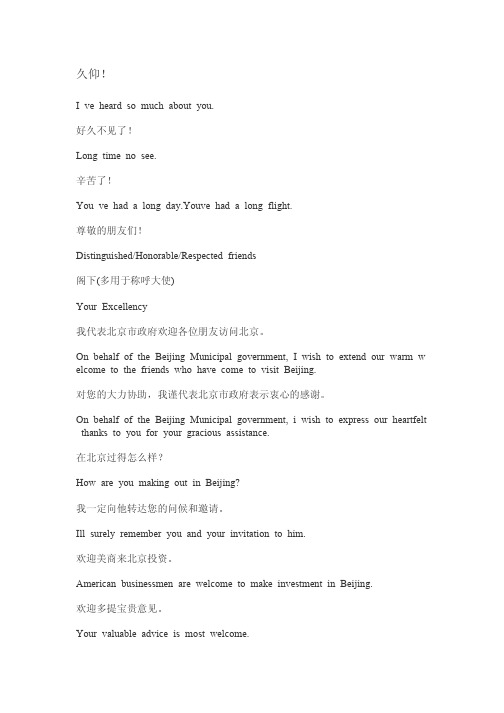
久仰!I ve heard so much about you.好久不见了!Long time no see.辛苦了!You ve had a long day.Youve had a long flight.尊敬的朋友们!Distinguished/Honorable/Respected friends阁下(多用于称呼大使)Your Excellency我代表北京市政府欢迎各位朋友访问北京。
On behalf of the Beijing Municipal government, I wish to extend our warm w elcome to the friends who have come to visit Beijing.对您的大力协助,我谨代表北京市政府表示衷心的感谢。
On behalf of the Beijing Municipal government, i wish to express our heartfelt thanks to you for your gracious assistance.在北京过得怎么样?How are you making out in Beijing?我一定向他转达您的问候和邀请。
Ill surely remember you and your invitation to him.欢迎美商来北京投资。
American businessmen are welcome to make investment in Beijing.欢迎多提宝贵意见。
Your valuable advice is most welcome.不虚此行!Its a rewarding trip!您的日程很紧,我们的会见是否就到此为止。
As you have a tight schedule, I will not take up more of your time. 请代我问候王先生。
商务英语(bec)中级考试

商务英语中级考试(BEC中级)是剑桥商务英语证书(BEC)的其中一级,分为笔试(BECPreliminaryTest)和口试(BECPreliminarySpeakingTest)两部分。
BEC中级考试内容分为阅读、写作、听力、口语四大部分,总时长为115分钟。
其中,阅读60分钟、写作70分钟、听力30分钟、口语11分钟。
BEC中级考试主要适用于商贸英、日、俄、法、西等语种专业各级别,也适用于外经贸各级别、招商引资和对外劳务合作出境考察以及各种外事翻译工作。
此外,BEC中级证书的适用范围也非常广泛,不仅限于商业领域,还可以用于申请移民签证、出国工作、申请国际商科留学等方面。
总之,商务英语中级考试(BEC中级)是一项具有较高含金量的考试,对于想要提高英语水平并了解商务知识的人来说是一项非常有价值的证书。
- 1、下载文档前请自行甄别文档内容的完整性,平台不提供额外的编辑、内容补充、找答案等附加服务。
- 2、"仅部分预览"的文档,不可在线预览部分如存在完整性等问题,可反馈申请退款(可完整预览的文档不适用该条件!)。
- 3、如文档侵犯您的权益,请联系客服反馈,我们会尽快为您处理(人工客服工作时间:9:00-18:30)。
1 List each staff member and corresponding salary for the employee in a spreadsheet to get an idea of the total current staffing cost on a weekly, monthly and yearly basis.2Develop your staff budget in the same spreadsheet. After totaling up the expe nses, establish a firm ceiling for expenditures on staff. Make adjustments to the budget expenses over time to ensure compliance with that staff spending maximum. As the business grows, you can increase the limit to hire more people as needed.3Evaluate need in the department regarding staff periodically. Ask current workers if they need assistance with their work and monitor the work process to decide if more staff is necessary.4Monitor the productivity of current staff to make further decisions regarding the budget, particularly staff cuts if required. Y ou can keep tabs on the performance of workers using software and regular performance reviews (meetings to discuss each worker's progress). For instance, companies can keep track of the efficiency of data entry professionals with software that times and evaluated entries over a period of time.5Make additions or deletions to the current staff and corresponding budget based on your findings periodically. For instance, if you find that an employee isn't meeting productivity goals nor helping the firm operate efficiently, you might decide to eliminate that position and update the staff budget accordingly.6Set a date to adjust the staff budget each year after taking into account all factors (such as productivity and revenues) from the previous year. As staffing managers Gennie Justus and Joyce Siegele of Northside Hospital in Atlanta explain, budgeting changes are based on trends, historical numbers of employees and internal changes. Effective feedback is specific, not general. (Say, "The report you turned in yesterday was well-written, understandable, and made your points about the budget very effectively." Don't say, "good report.")Effective feedback always focuses on a specific behavior, not on a person or their intentions. (When you held competing conversations during the meeting, when Mary had the floor, you distracted the people in attendance.)The best feedback is sincerely and honestly provided to help. Trust me, people will know if they are receiving it for any other reason.Successful feedback describes actions or behavior that the ind ividual can do something about.Whenever possible, feedback that is requested is more powerful. Ask permission to provide feedback. Say, "I'd like to give you some feedback about the presentation, is that okay with you?"Effective feedback involves the sharing of information and observations. It does not include advice unless you have permission or advice was requested.Effective feedback is well timed. Whether the feedback is positive or constructive provide the information as closely tied to the event as possible.Effective feedback involves what or how something was done, not why. Asking why is asking people about their motivation and that provokes defensiveness.Check to make sure the other person understood what you communicated by using a feedback loop, such as asking a question or observing changed behavior.Effective feedback is as consistent as possible. If the actions are great today, they're great tomorrow. If the policy violation merits discipline, it should always merit discipline.Tips:Feedback is communication to a person or a team of people regarding the effect their behavior is having on another person, the organization, the customer, or the team. Positive feedback involves telling someone about good performance. Make this feedback timely, specific, and frequent.Constructive feedback alerts an individual to an area in which his performance could improve. Constructive feedback is not criticism; it is descriptive and should always be directed to the action, not the person.The main purpose of constructive feedback is to help people understand where they stand in relation to expected and/or productive job behavior.Recognition for effective performance is a powerful motivator. Most people want to obtain more recognition, so recognition fosters more of the appreciated首先是Marketing,一般presentation部分考官会给三个题目供你选择,可以说必有一道是关于Marketing的,所以这方面的材料要好好准备。
以下是我当时准备的一些常用材料。
I. Pricing Strategy1. the product itself: the cost of producing plus your expecting profit2. similar products, the rival firms: What are their prices? What are your product’s competitive advantages? In what aspect does your product superior to others? This can add extra value to your product.3. target customer: Whether they are wealthy or not? Can they afford the price?Ex: How to ensure that price levels for new products are set appropriately?○1 The first problem is who your target customers are. Their income, occupation, preference.○2 Do market research to make sure whether your target customers can afford the price level. There are mainly four ways of doing market research: survey, telephone interview, observation and questionnaire.○3 Test your product in a small region. Find out how it sells, get the feedbacks of the customers. Decide whether to make any adjustment.II. Product PackageEx: The importance of packaging products appropriately○1 Traditionally, the purpose of packaging a product is to protect the product or tomake it convenient for carrying, as some products are liquid or sticky.○2 Today, the package add value to th e product, especially to the consumer goods. The package is the product’s first impression to the customer. They may judge the quality of the product by its package and decide whether to buy it or not. Sometimes, a gorgeous package is a symbol of identity, especially when the product serves as a gift or present.○3 Y ou have to packaging your products appropriately so that your products can stand out from the crowd and be bought by the customers.III. DiversificationEx: The importance of product diversification to the success of a business.这时你可能对product diversification并不是很熟悉,可以举一些案例,比如, the case of coca-cola: despite of its regular cola, it produce diet cola for people who get diabetes or adiposity problems. 然后借以说明product diversification的作用。
